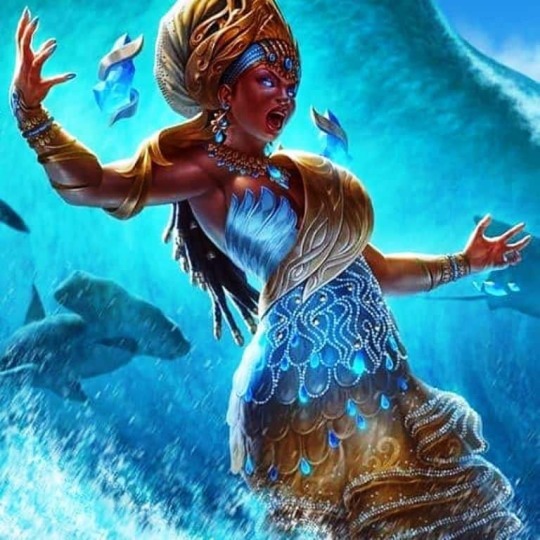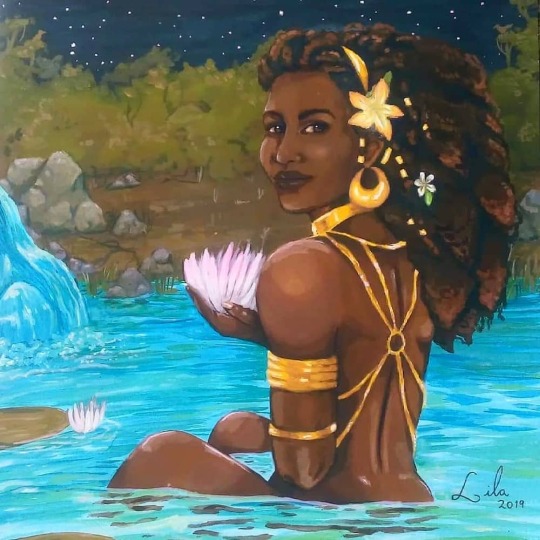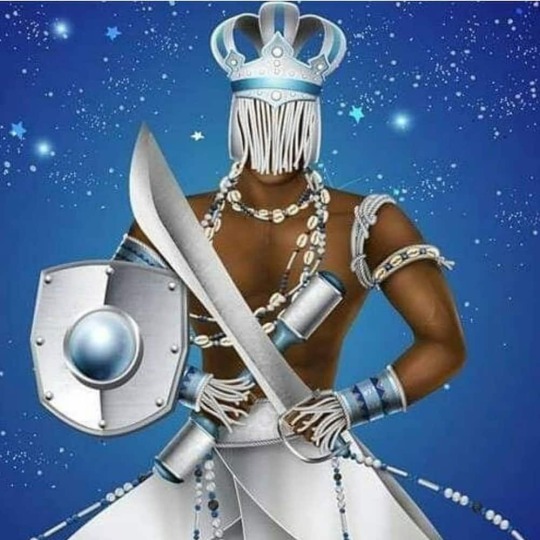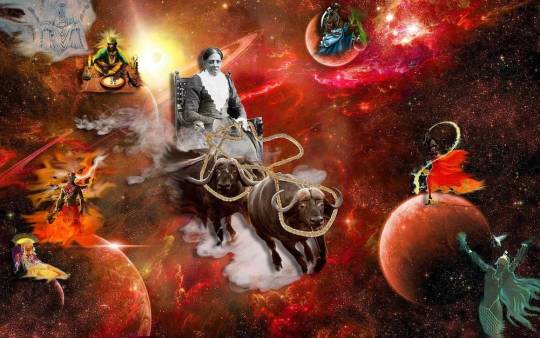#anyanwu
Explore tagged Tumblr posts
Text

IGBOS RELIGION AND EXPRESSIVE CULTURE
BELIEFS
Although many Igbo people are now Christians, traditional Igbo religious practices still abound. The traditional Igbo religion includes an uncontested general reverence for Ala or Ana, the earth Arushi, and beliefs and rituals related to numerous other male and female deities, spirits, and ancestors, who protect their living descendants.

Revelation of the will of certain deities is sought through oracles and divination. The claim that the Igbo acknowledge a creator God or Supreme Being, Chukwu or Chineka, is, however, contested. Some see it as historical within the context of centralized political formations, borrowings from Islam and Christianity, and the invention of sky (Igwe) Arushi. The primordial earth goddess and other deified spirits have shrines and temples of worship and affect the living in very real and direct ways, but there are none dedicated to Chukwu. Ala encapsulates both politics and religion in Igbo society by fusing together space, custom, and ethics ( omenala); some refer to Ala as the constitutional deity of the Igbo.

The Igbo concept of personhood and the dialectic between individual choice/freedom and destiny or fate is embodied in the notion of chi, variously interpreted as spirit double, guardian angel, personal Arushi, personality soul, or divine nature. Igbo have varied accounts of myths of origin because there are many gods and goddesses. According to one Igbo worldview, Chukwu created the visible universe, uwa. The universe is divided into two levels: the natural level, uwa, or human world, and the spiritual level of spirits, which include Anyanwu, the sun; Igwe, the sky; Andala (or Ana), the earth; women's water spirits/goddesses, and forest spirits. Through taboos, the Igbo forge a mediatory category of relations with nature and certain animals such as pythons, crocodiles, tigers, tortoises, and fish.
177Acculturation and Culture Contact
771General Character of Religion
776Spirits and Gods
787Revelation and Divination
795Religious Denominations

RELIGIOUS PRACTITIONERS
There are two different kinds of priests: the hereditary lineage priests and priests who are chosen by particular deities for their service. Diviners and priests—those empowered with ofo, the symbol of authority, truth, and justice—interpret the wishes of the spirits, who bless and favor devotees as well as punish social offenders and those who unwittingly infringe their privileges, and placate the spirits with ceremonial sacrifices.
791Magicians and Diviners
793Priesthood

DEATH AND AFTERLIFE
The living, the dead, and the unborn form part of a continuum. Enshrined ancestors are those who lived their lives well and died in a socially acceptable manner (i.e., were given the proper burial rites). These ancestors live in one of the worlds of the dead that mirrors the world of the living. The living pay tribute to their ancestors by honoring them through sacrifices.

#african#afrakan#kemetic dreams#africans#brownskin#afrakans#brown skin#african culture#afrakan spirituality#african spirituality#odinani#afterlife#death#resurrection#sacrifice#extraterrestrial#spirits#ofo#Chukwu#Anyanwu#chi#uwa#Diviners#Andala#traditional Igbo religious#omenala
7 notes
·
View notes
Text
youtube
Pedro Pascal in "For All the Lovesick Mad Sad Geniuses" by Ngozi Anyanwu
#your friendly reminder that this is a thing that just...exists?#in this lifetime?#like it's no big deal?#and it's so beautiful#he is so fucking talented it hurts to look at him#why did you have to love me back#give this man an oscar#pedro pascal#pedro fuckin' pascal#Ngozi Anyanwu#For All the Lovesick Mad Sad Geniuses#Youtube
6 notes
·
View notes
Text
every recommendation for octavia butler ive seen has never once told me what the fuck she actually wrote, and after reading parable of the sower maybe i should’ve guessed that wild seed would be fucking… well. is it fair to keep thinking “NO!! STOP!! GET AWAY FROM HER” with regards to doro because. oh boy. GET AWAY FROM HER.
7 notes
·
View notes
Text
Betty Akeredolu bags Doctoral Degree, dedicates it to late husband, Aketi
Former Ondo State First Lady, Chief Betty Anyanwu-Akeredolu has bagged a doctorate degree from the Federal University of Technology and Agriculture, FUTA, Akure, Ondo State. The Nigerian aquaculturist who was the first lady of Ondo State in Nigeria from 2017 to 2023.succesfully defended her PhD Thesis Friday before a crack team of erudite professors and the Imo State-born politician came out of…
0 notes
Text
Remains of Akeredolu arrives Nigeria
Remains of Akeredolu arrives Nigeria Late former Governor of Ondo State, Rotimi Akeredolu’s body has arrived in Nigeria. Remains of Akeredolu were brought into the country from Germany, where he passed away. The reports indicated that the aircraft carrying the body arrived at approximately 3:39 p.m. on Friday, January 5, 2024. Chief Betty Anyanwu-Akeredolu, the late governor’s wife, along with…
View On WordPress
#Akeredolu#Chief Betty Anyanwu-Akeredolu#Demola Adeleke#Engr. Ade Adetimehin#Germany#Governor of Ondo State#Hon. Gboyega Adefarati#Lagos State governor#Mr Babajide Sanwo-Olu#Mr. Tayo Ayinde#Mr. Tokunbi Talabi#Ogun State Governor#Ondo State#Prince Dapo Abiodun#Rotimi Akeredolu
0 notes
Text







Good Grief
Written by Ngozi Anyanwu
Dir. Awoye Timpo at the Vineyard Theatre, 2018
Nkechi was a good Nigerian-American girl. She did everything right. Went to med school. Made plans. Then life happened. And plans changed. A first-generation coming-of-age journey of love, loss, and growing into adulthood, GOOD GRIEF follows Nkechi as she navigates Pennsylvania’s suburbs alongside her childhood crush, her would-be-philosopher brother, and her immigrant parents.
(Photos by Carol Rosegg)
0 notes
Text
Andres Anyanwu (in the beanie), Marc Jacobs, Jonathan Wyssmann, and Federico Parisi, shot by Lorenzo Sodi and featured in WM Brown

Winter whites.
#Andres Anyanwu#andrew_0515#Marc Jacobs model#Marc Jacobs fashion#Marc Jacobs suit supply#Suit Supply Marc Jacobs#marcspply#Jonathan Wyssmann#jonathanwyssmann#Federico Parisi#fede.parisi
57 notes
·
View notes
Text
The Captive's Crown: A story of inclusion, diversity and redemption by Olusola Sophia Anyanwu [REVIEW]
The Captive’s Crown: A story of inclusion, diversity and redemption by Olusola Sophia Anyanwu [REVIEW]
SYNOPSIS A story of inclusion, diversity and redemption. Dreadful circumstances have led Eliana and her associates into the path of prostitution. Despised as outcasts and shunned by society, they lack hope and hide their true identities. Eliana thought her past was behind her for good when she became a wife and a mother! By a twist of fate, she finds herself back in the pit of prostitution.Will…

View On WordPress
0 notes
Text




Anyanwu rose up in the East on Eke market day. The flame seeked truth from the messenger of the earth, the Eke (python). The Eke formed the spiral of Anyanwu’s destiny and whispered to the flame from a very young age. Whispers that came in form of symbols of the earth, numerology, intuition, re-memory and rhythms…
469 notes
·
View notes
Text
Having a hard time articulating this. But I think one of the reasons I love Octavia Butler's work so much is that, as much as her work is about systems of power, she first empowers her protagonists before she disempowers them. She let's the reader be freed from seeing most realistic depictions of abuse, and then sets up a fantastical form of power to explore the themes in. This makes her books simultaneously disturbing and empowering.
Thinking specifically about Wild Seed and Dawn. Lilith has protection from physical and sexual assault. Cool! Now to deal with an alien race that has a complex plan to coerce humans into breeding with them. Anyanwu is powerful enough that no mortal man can harm her. Cool! Now here is an immortal man that can track her wherever she is.
#shut up clark#please talk to me about this I'm desperate#octavia butler#Lilith's brood#Xenogenesis#wild seed#patternist series
49 notes
·
View notes
Text
Have you heard of Anyanwu before? 🌞🇳🇬 Anyanwu is the sun goddess of the good fortune, knowledge, and wisdom in the traditional #igbo religion called Odinala. Her name means “eye of the sun”. It is believed Anyanwu is God’s eyes on earth as she sees the unseeable. The popular adage “Nothing can be hidden under the sun”, is rooted in the worship of Anyanwu. Anyanwu is also the goddess of productivity, sound health and well-being of her people. 📝 Community Notes: For our resident Igbo’s & a few talking points: - In some communities, Ayanwu is not considered an Alusi and is male energy instead of female - Market days: eke is Masculine: sun, orie feminine: water, afor masculine: earth, nkwo is feminine: wind (is this your understanding of the Igbo market days?) - Pronunciations are not perfect here, please if your comment is about pronunciation, simply be respectful and add the phonetic example below or a way to help 😅 basically be constructive so far we heard is like Ar-yaa-woon? - Also someone said Igbo is with the strong “gb” sound rather than “ibo” which we haven’t heard from others.
13 notes
·
View notes
Text
50+ African gods names and meanings - Tuko.co.ke

African communities have so many gods and goddesses, and each one has its own role to play in life. Some gods and goddesses are for wealth, war, health, healing, protection, death, evil, creation, and so on. Africans who believe in these gods consider it essential to worship and adore these gods and goddesses to have a good and smooth life.
Even though the larger religions such as Christianity and Islam have made big inroads in the African continent, the African gods and goddesses are still worshipped today. Here are the names of African gods:
African god of war
Ogun - Ogun is a god of war who defends the Yoruba tribe and is depicted wearing armor and red eyes.
Kibuka - Kibuka is the Buganda god of war who secures victory in war by taking the form of a cloud, which hovered above his enemies and rained spears and arrows.
Age-Fon - During the days of wars and battles, Agé was called upon to protect and give strength to the warriors, leading them on which paths to take.
Menhit - The war goddess was believed to advance ahead of the Egyptian armies and cut down their enemies with fiery arrows.
Tano - He is the goddess of war and strife for the Ashanti people.
Apedemak - The Nubian lion-headed warrior god.
Takhar - He is the god of justice or vengeance. He is a demi-god in Senegal's Serer religion and is worshipped to protect believers against injury, bad omens, and abuse.
Maher- Ethiopian god of war

Shango - Shango is the Yoruba god of war and thunder. Oral tradition describes him as powerful, with a voice like thunder and a mouth that spewed fire when he spoke.
Oya - She is the wife of Shango. Oya is a ferocious and protective deity worshipped by the Yoruba. She is the goddess of wind, thunderbolt, and fire.
African god of wealth
Mukasa - He is the brother of Kibuka, the god of war. His main oracular sanctuary was found on an island in Lake Victoria. This god provides rain, food, and cattle.
Oko - Oko is the god of agriculture and fertility. He came to Earth and lived on a small farm, growing some of the most beautiful and delicious fruits and vegetables.
Olokun - Olokun is believed to be the parent of Aje, the orisha of great wealth. He gives great wealth, health, and prosperity to his followers.
Aje - Aje is a traditional goddess of abundance and wealth, often associated with the business of the marketplace in the Yoruba religion.
Oshun - Oshun is a divine being associated with love and fertility, as well as financial fortune in the Yoruba religion.
Ikenga - Ikenga is a personal god of human endeavor, achievement, success, and victory. He is grounded in the belief that a man's power to accomplish things is in his right hand.
Anyanwu - This is the goddess of the sun. She is revered as the goddess that promotes productivity, hard work, and overall positive well-being.
Njoku Ji - This is the guardian deity of yam in Igboland. She is prayed to for productivity during the farming season.
Mami Wata - Mami Wata is famous as the African god of money. The goddess has the power to bestow good fortune and status through monetary wealth.
Wamala - He is the god of wealth and prosperity.
Anayaroli - He is the god of wealth.
Ashiakle - She is a famous goddess of wealth and prosperity in West Africa.
Abena - She is known as the river goddess. Her name is associated with gold, brass, as well as with other wealth symbols.
African god of healing
Agwu - Nsi - This is the god of health and divination. This god is one of the basic theological concepts used to explain good and bad, health and sickness, poverty, and wealth in Igboland.
Osanyin - He is the Yoruba Orisha of herbalism, and he possesses the powers to cure all diseases.

Xu - He is the sky god of the Bushmen in South Africa. Xu is usually invoked during an illness.
Aja - Aja is a powerful healer in Yoruba legend. It is said that she is the spirit who taught all other healers their craft.
Babalu Aye - Babalu Aye is an Orisha often associated with plague and pestilence in the Yoruba belief system. Just as he is connected with disease and illness, he is also tied to its cures.
African evil gods
Amadioha - This is the most popular god in Igboland. He is the god of thunder & lightening. Amadioha is considered a gentleman among the deities and the cruelest when annoyed.
Adroa - Adroa is the god of death with two characters: good and evil. His body is split into two. One half is short and black, which represents evil, while the other half is tall and white and depicts goodness.
Gaunab - He is the Xhosa and Khoikhoi evil god. He is responsible for all misfortune, disease, and death.
Modimo - He represents all the good things. Yet, in the same breath, he had the power to destroy things and bring about natural disasters and devastation.
Ogo - He is the chaos god among the Dogon. Ogo is a horrifically awful trickster god, the embodiment of chaos, and a rebel of horribleness.
African god of death
Anubis - Anubis, the guardian of the dead, is one of the most well-known Egyptian gods. He's mainly depicted as a dog-like figure and leads the dead to Ma'at, where their hearts are weighed.
Ogbunabali - Literally meaning "the one that kills at night." He is known as the death deity. Ogbunabali is known to kill violently.
Gamab - Gamab lives in the sky and directs the fate of mankind. When it's time for someone to die, Gamab gets out his bow and shoots them down with an arrow.
Oya - She is also a goddess of death. Oya is the guardian of the gates of death, as she helps the dead in their transition from life.
African god of creation
Mbombo - Mbombo is the creator god in the mythology of the Kuba people. It is believed that Mbombo was alone, darkness and primordial water covered all the earth. He felt an intense pain in his stomach and then vomited the sun, the moon, and stars.
Olorun - He is the ruler of the sky and the creator of the sun.
Obatala - He is the creator of humans, mountains, valleys, forests, and fields.
Unkulunkulu - He grew from reeds and brought with him people and cattle. Upon his own creation, he created the earth and all of its creatures.

Ra - The sun god arose from Nun, a chaotic body of water that was the only thing in existence. He independently gave birth to Shu, the god of air, and Tefnut, the water goddess. They then produced Geb and Nut, the god of the earth and the goddess of the sky, respectively. The first humans to exist were from Ra's tears.
Kaang - He is the creator god of the universe, according to the San people.
Nana - Buluku - Nana Buluku is the mother of Mawu-Lisa and the goddess of creation. She is associated with the sun and moon.
Odomankoma - This is the name Akan-language speakers use to describe the eternal entity who deserves the credit for the work of creation, including creating the concept of trinity.
Modjaji - She is a South African goddess of rain whose spirits live in a young woman's body. The goddess is considered a key figure as she can start and stop the rain.
African god of fertility
Ala - She is the most respected god in Igboland. The goddess represents the earth, fertility, creativity, and morality.
Oshun - She is one of the most powerful of all orishas in the Yoruba religion. She is associated with water, purity, fertility, love, and sensuality.
Asase Ya - Asase Ya is the Earth goddess of fertility of the Ashanti people of Ghana. She is the wife of Nyame, the Sky deity, who created the universe.
Mbaba Mwana Waresa - She is the Zulu goddess of fertility.
Denka - He is the Dinka god of fertility.
Yemaya - She is the childbirth goddess in the Yoruba religion. She is considered the mother of all since she is the goddess of the living ocean.
Who is the most powerful African god?

Oshún is a Yoruba orisha, daughter of Yemoja, a Nigerian river goddess. She is the protector of the family and pregnant women. Oshun is typically associated with water, purity, fertility, love, and sensuality. She is considered one of the most powerful of all orishas in the Yoruba religion. She possesses human attributes such as vanity, jealousy, and spite.
There you have it. A comprehensive list of African gods' names and meanings. With the introduction of larger religions such as Islam and Christianity, the concept of African deity is slowly losing its meaning. However, some ethnic communities still believe in and worship these gods and goddesses even today.
Tuko.co.ke published an article about the list of major religions in Africa. Before the white man came to Africa, the African people had a doctrine. Little is known about the ancient African religions. However, it is a fact that all doctrines have common features such as belief in a supernatural power, the belief of life after death and the beliefs surrounding burial.
Research shows that the majority of citizens in Nigeria and Africa as a whole are devoted Christians. The African continent has a variety of religions practised across all regions. In Africa, religiosity has a big influence on arts, culture, lifestyle and traditions of its people.
21 notes
·
View notes
Text
Doro is an entity who changes bodies like clothes, killing his hosts by reflex or design. He fears no one until he meets Anyanwu. Anyanwu is a shapeshifter who can absorb bullets and heal with a kiss and savage anyone who threatens her. She fears no one until she meets Doro. Together they weave a pattern of destiny (from Africa to the New World) unimaginable to mortals.



#book: wild seed#author: octavia e. butler#genre: fantasy#genre: sci fi#genre: historical fiction#genre: speculative fiction#year: 1980s
13 notes
·
View notes
Text
7 notes
·
View notes





